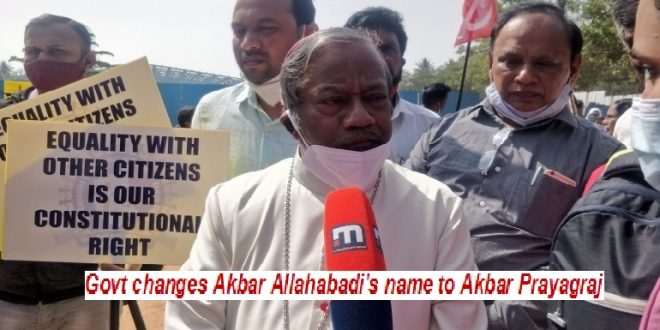30-12-2021
By SJA Jafri + Bureau Report + Al Jazeera
NEW DELHI/ BENGALURE: Netizens have reacted vehemently to the Indian government’s decision to change the name of great Muslim poet Akbar Allahabadi, Indian media reported on Wednesday.
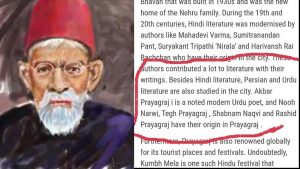 According to the Uttar Pradesh Higher Education Services Commission (UPHESC), an autonomous authority under the state government, the poet has been renamed Akbar Prayagraj.
According to the Uttar Pradesh Higher Education Services Commission (UPHESC), an autonomous authority under the state government, the poet has been renamed Akbar Prayagraj.
The extremist government of Yogi Adityanath renamed the Allahabad district Prayagraj in 2018.
On the UPHESC’s official website, in the “About Allahabad” section, the name of Urdu poet Syed Akbar Hussain, also known as Akbar Allahabadi, has been changed to Akbar Prayagraj.
Referring to poets and writers who are from the city, the website says, “Besides Hindi literature, Persian and Urdu literature are also studied in the city. Akbar Prayagraj is a noted modern Urdu poet…”
On the UPHESC website, the state government has changed the names of all such writers or poets who used “Allahabadi” as a suffix with “Prayagraj.”
In response to questions from The Print, UP Deputy Chief Minister and Education Minister Dinesh Sharma said he was unaware of the changes and that UPHESC was a separate entity.
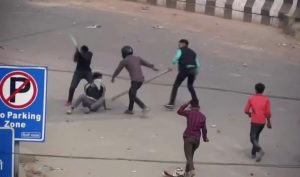 He told the publication, “I’ll have to check with the officials at UPHESC regarding the name change, it’s an autonomous entity.” In February 1921, the famed poet died.
He told the publication, “I’ll have to check with the officials at UPHESC regarding the name change, it’s an autonomous entity.” In February 1921, the famed poet died.
Meanwhile, just days before Christmas, as Pastor Peter Benjamin prepared to address a prayer meeting and assessed the crowd in front of him at India’s tech hub of Bengaluru in the southern state of Karnataka, his heart skipped a beat. What if a mob suddenly walked in and started attacking everyone around, he thought to himself.
On December 23, his fears came true, albeit at a place around 160km (100 miles) away. A Hindu vigilante mob barged into a convent school in Karnataka’s Mandya district and disrupted a small Christmas celebration taking place. They shouted at the teachers and ordered them to stop the celebration, accusing them of “converting” Hindu children to Christianity.
On the same day, the Karnataka state assembly passed a new anti-conversion legislation, called the Karnataka Protection of Right to Freedom of Religion Bill, 2021. The bill now awaits its passage in the state legislative council to become a law.
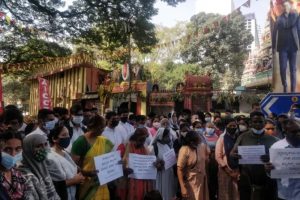 Karnataka will be the 10th state in India to enact the so-called “Freedom of Religion” law. The legislation bars religious conversions, except when a person “reconverts to his immediate previous religion”, a clause that critics say is aimed at enabling India’s many Hindu supremacist groups to convert Muslims and Christians into Hindus.
Karnataka will be the 10th state in India to enact the so-called “Freedom of Religion” law. The legislation bars religious conversions, except when a person “reconverts to his immediate previous religion”, a clause that critics say is aimed at enabling India’s many Hindu supremacist groups to convert Muslims and Christians into Hindus.
Moreover, marriages conducted with the intention of conversion can be cancelled and those found guilty can be jailed for up to 10 years, according to the bill.
The ruling BJP claims the bill aims to stop “the illegal and large-scale conversion of Hindus to Christianity”, an allegation the party has yet to prove. Opposition parties and civil society groups have termed the proposed law “unconstitutional and undemocratic”.
42 attacks this year
According to the 2011 census, Christians constitute about 2.3 percent of India’s 1.3 billion people. The Hindu-majority country is home to Asia’s second largest number of Catholic Christians after the Philippines.
According to a fact-finding report by the United Christian Forum, Association for Protection of Civil Rights and United Against Hate civil society groups, India witnessed 305 attacks on the Christian 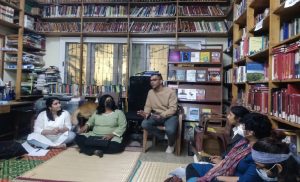 community and their places of worship in the nine months until September 2021. Of the 305 incidents, 66 took place in the northern state of Uttar Pradesh and 47 in Chhattisgarh.
community and their places of worship in the nine months until September 2021. Of the 305 incidents, 66 took place in the northern state of Uttar Pradesh and 47 in Chhattisgarh.
The attacks intensified during the Christmas weekend when celebrations were disrupted by right-wing Hindu mobs. In a related development on Monday, India’s home ministry blocked foreign funding for Missionaries of Charity, a prominent charity founded by Nobel Peace Prize laureate Mother Teresa in 1950.
In Karnataka, the community has faced increasing harassment for years, but this year saw a notable surge as at least 42 attacks on Christians and their religious places were documented. Three of those incidents, vandalizing a church in Chikkaballapur, disrupting a naming ceremony in Hubli, and a mob forcibly entering a convent school in Mandya, were reported just hours before and after the passage of the anti-conversion bill.
Rights activists fear the actual numbers could be more as some cases of atrocities against the community, which forms 1.87 percent of Karnataka’s 64 million population, go unreported.
Community leaders and activists said the hate and violence against Christians were reminiscent of 2008, when at least 20 churches were vandalized by Hindu groups in Karnataka. Just as it does 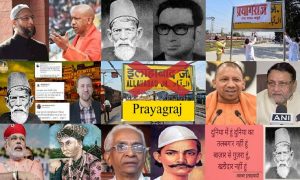 now, Karnataka had a BJP government in the state in 2008 as well but activists say the number of hate crimes against Christians in the state saw a marked rise in 2021.
now, Karnataka had a BJP government in the state in 2008 as well but activists say the number of hate crimes against Christians in the state saw a marked rise in 2021.
One such attack happened at a small church run by Benjamin in Bengaluru on March 18. He recalled a series of “unsavory” incidents that took place immediately before the attack that proved to be “ominous”.
“On several occasions, dog faeces and garbage were thrown on the church premises. Some miscreants peed on the church walls. Once they locked the bathroom door while users were inside,” he told Al Jazeera.
On the day of the attack, three men, one of them his neighbor, came inside the church during prayers. “They threatened to burn the church, rape my wife and kill us. They accused us of making a lot of noise and causing disturbance in the neighborhood” but according to Benjamin, his church had been soundproofed. “There was no way that our hymns and prayers could cross the church walls,” he said.
The next day, before Benjamin could file a First Information Report (FIR) with police, his attackers instead registered one against him. The pastor was booked under various sections of the Indian 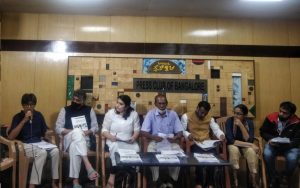 penal code, including criminal intimidation, deliberate and malicious intention of outraging a person’s religious feelings and even public nuisance. He secured bail to save himself from arrest.
penal code, including criminal intimidation, deliberate and malicious intention of outraging a person’s religious feelings and even public nuisance. He secured bail to save himself from arrest.
“We were not allowed to pray in that hall anymore and had to find another place. There were women and children in the prayer hall on the day of the attack. Now, they feel vulnerable,” Benjamin told Al Jazeera.
A similar pattern runs in most of the attacks across Karnataka, often violent, against Christians and their places of worship by suspected members of Rashtriya Swayamsevak Sangh (RSS), the far-right ideological mentor of the BJP; Bajrang Dal, its armed wing; and local Hindu vigilante groups such as Hindu Jagaran Vedike (HJV) and Banjara Nigama.
A recent report by rights group, the People’s Union for Civil Liberties (PUCL), said in such attacks, carried out on the pretext of stopping the “illegal conversion” of Hindus into Christianity, “the police were either mute spectators or helped the Hindu vigilantes”.
In many instances, such as ones in Belagavi and Bengaluru, the police and local administration asked Christians to stop conducting prayer meetings to avoid attacks from the Hindu groups.
“The main allegation of Hindutva vigilante groups is conversion (either by force or allurement) of Hindus to Christianity. Their modus operandi is always the same. The attackers enter the places of 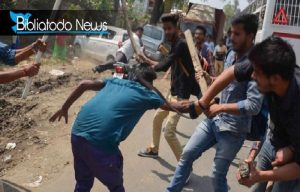 worship and verbally abuse the pastors. During these attacks, the Hindutva (Hindu supremacist) groups beat up people and hurl casteist slurs. They don’t even spare women and children. The attackers also sexually abuse women,” PUCL official Shujayathulla, who goes by his first name only, told Al Jazeera, citing the report.
worship and verbally abuse the pastors. During these attacks, the Hindutva (Hindu supremacist) groups beat up people and hurl casteist slurs. They don’t even spare women and children. The attackers also sexually abuse women,” PUCL official Shujayathulla, who goes by his first name only, told Al Jazeera, citing the report.
“After every attack, the police take the pastor and members of the minority group to the local police station and file cases against them,” he added.
Several videos of such anti-Christian attacks are available on social media. “The videos are circulated both as a ‘victory against the Christian forces’ and as a tool to instil fear in all those who dare to practice their religion, which is a fundamental right,” said Shujayathulla.
Robin Christopher, a lawyer representing several victims of hate attacks who have been booked by the police, said securing bail for them is difficult.
“It all depends on whether the victims have access to legal help and resources. The cases are taking a physical, financial and mental toll on them,” he told Al Jazeera.
Job losses and social boycott
 The repeated assaults on Christians have also resulted in them facing social boycotts and threats to their livelihood. The fear is so strong that some victims do not even want to speak to the media. Many of those Al Jazeera spoke to preferred to remain anonymous.
The repeated assaults on Christians have also resulted in them facing social boycotts and threats to their livelihood. The fear is so strong that some victims do not even want to speak to the media. Many of those Al Jazeera spoke to preferred to remain anonymous.
Benjamin, the pastor, is the only victim of hate attacks who did not ask for his name to be changed for this report. “I am not afraid of anything,” he said.
Most of the attacks were reported in Karnataka’s small towns and villages.
On December 12, Christian religious books were burned by Hindu groups in Kolar district’s Srinivaspur. According to a rights activist from Kolar, once an individual becomes the target of a hate crime because of their religion or caste, neighbors, employers and even friends distance themselves from the victim.
“Nobody wants to be seen close to the victims because the attackers have the blessings of politicians in power,” said the activist who agreed to speak only on condition of anonymity.
Pastor Vinay (name changed) from Udupi district is facing a similar “social boycott”.
On September 10, a right-wing Hindu mob attacked while the pastor was conducting a prayer meeting in the district’s Nitte village. “The mob beat up and injured several devotees. They even ripped off a woman’s blouse,” he alleged.
 Pressmediaofindia
Pressmediaofindia
